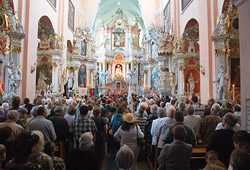Piety and Pilgrimages
From the time it was consecrated in 1635, the Bernardine monastery church in Tytuvėnai has been named in honour of the Blessed Virgin Mary, Queen of the Angels – a distinctive title which is specific to Bernardine traditions of piety. A painting of the Mother of God and Child that is renowned for special graces has adorned the main altar of the church since the 1620s. The sanctuary acquired a double significance for pilgrims after construction of the Way of the Cross and Holy Steps Chapel in 1770-1781. The devout souls who came to Tytuvėnai could, on the one hand, turn to the Mother of God for assistance and earn the so-called “Porziuncola” indulgence. At the same time, they could relive Christ’s Passion by following the Stations of the Cross and praying at the Holy Steps Chapel. Thus, the shrine complex of Tytuvėnai came to combine devotion to the Blessed Virgin Mary and devotion to the Suffering Christ.
The Bernardine Order gave particular attention to the Way of the Cross, whose installation at Tytuvėnai was meant to express the idea of the monastery being a link to the Holy City, an image of the New Jerusalem. Between 1771 and 1780, a spacious enclosed courtyard with a covered passageway around the perimeter was set up to house the Stations of the Cross. This arrangement has not changed since then. Pope Benedict XIII granted an indulgence for all those who pray at this Way of the Cross.
The Chapel of the Stairs of Christ, or “Holy Steps Chapel”, was built in the centre of the courtyard in 1774-1775. It reflects the popularity of devotion to the Holy Steps throughout Europe in the period after the Council of Trent. The Holy Steps and the Way of the Cross are traditions that complement each other, although they initially existed as two distinct devotions. The devotion to the Holy Steps is based on the idea that Christ climbed a 28-step marble staircase at Pilate’s palace six times during his Passion. People who come here to meditate about the Passion of Christ climb and descend the staircase on their knees, pausing to kiss the holy relics contained under glass in each step.
Visiting the Holy Steps is intended to help a person feel sorrow for Christ’s suffering and humiliation, and identify with the humility and sacrifice that Christ showed by dying for the sins of humankind. In 1774, Pope Clement XIV granted an indulgence for all who visit the Holy Steps at the Tytuvėnai monastery and climb them on their knees on four days, which were to be established by the bishop of Samogitia. In 1775, the bishop established as days for the indulgence the feasts of the Epiphany, the Lord’s Ascension into Heaven and St John the Baptist, and the days in the octave of Mary’s Immaculate Conception. A Pilgrim Guide to the Holy Steps at Tytuvėnai was published in Vilnius in the 18th century.
Devotion to the Holy Steps remains vibrant even today, as shown by the pilgrims who come to visit the chapel from all parts of Lithuania and from other countries as well. They strictly abide by the long-standing traditions that people should only climb the Holy Stairs on their knees, should kiss the relics the glass-covered holy relics, and should pause on each step to pray.
Every September since 2003, participants of a walking pilgrimage from the Hill of Crosses to Šiluva have been stopping at Tytuvėnai to rest. An annual procession from Tytuvėnai to Šiluva was revived in 1993. During the Soviet years, such processions were organized by a group known as the Friends of the Eucharist. The procession, which bears a statue of Our Lady of Fatima from Tytuvėnai to Šiluva, is now an act of praise and thanksgiving to God and to Mary, the Mother of us all, for Lithuania’s regained independence and for those who worked to keep faith and hope alive despite persecution and imprisonment. Šiaulių Bishop Eugenijus Bartulis leads the procession, in which members of the Catholic organization Tradition, Family and Property (TFP) from various countries also take part.








